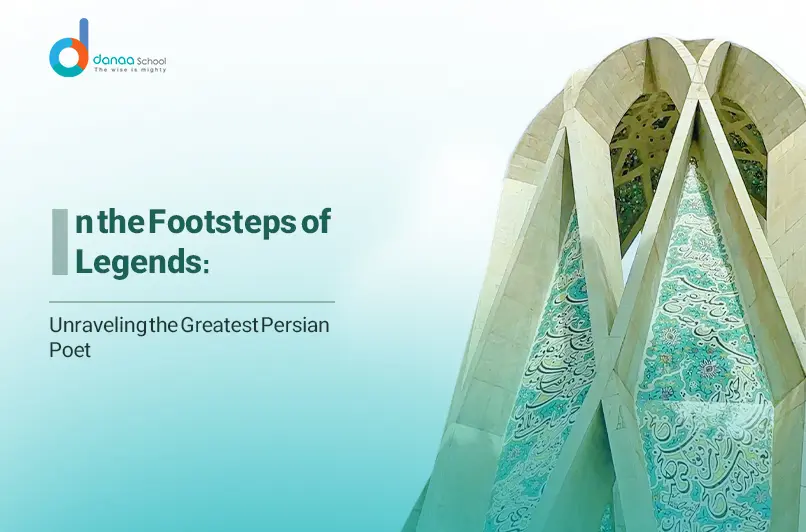Who is the Greatest Poet of Persian?
Persian poetry is a testament to the enduring power of language and expression, captivating audiences with its profound insights and timeless beauty. As we start on a journey through the annals of Persian literature, the question arises: Who is the greatest poet of Persian? This inquiry transcends mere accolades, exploring the hearts and minds of enthusiasts and scholars alike. In this exploration, we seek to identify the pinnacle of poetic brilliance and unravel the rich tapestry of Persian culture and heritage.
Introduction to Persian Poetry
The tapestry of Persian poetry is woven with threads of history, culture, and spirituality, creating a mosaic of lyrical beauty and profound wisdom. From the ancient verses of Ferdowsi to the mystical musings of Rumi, Persian poets have crafted a legacy that spans centuries, offering insights into the human condition and the mysteries of existence.
Historical Context of Persian Poetry
To understand the evolution of Persian poetry, one must navigate the corridors of history, tracing the footsteps of poets and scholars through the annals of time. From the splendor of the Abbasid Caliphate to the tumultuous era of the Safavid dynasty, Persian literature has flourished amidst the ebb and flow of political upheaval and cultural renaissance.
Influence of Persian Poetry on World Literature
The influence of Persian poetry extends far beyond the borders of Iran, permeating the works of poets, scholars, and artists across the globe. From the haunting verses of Hafez to the ecstatic hymns of Rumi, Persian poetry has left an indelible mark on world literature, inspiring generations with its universal themes of love, longing, and spiritual enlightenment.
Notable Persian Poets Throughout History
Hafez: Life and Background
Hafez, whose given name was Khwāja Shams-ud-Dīn Muḥammad Ḥāfeẓ-e Shīrāzī, remains one of the most celebrated figures in Persian literature. Born in Shiraz during the 14th century, Hafez’s life is mysterious. Yet, his poetry speaks volumes about the human experience and the quest for divine love and knowledge.
Style and Themes
Hafez’s poetry is a tapestry of mysticism and metaphor woven with threads of longing, ecstasy, and spiritual revelation. His ghazals, or love poems, explore the depths of human emotion with an eloquence and grace that transcends time and space, touching readers’ hearts across generations.
Legacy and Impact
Hafez’s legacy extends far beyond the borders of Iran, with his works revered by poets and scholars worldwide. His Divan, a collection of his poetry, continues to inspire readers with its profound insights into the nature of existence and the mysteries of the soul.
Rumi: Background and Life
Jalāl ad-Dīn Muhammad Rūmī, known simply as Rumi, was born in Balkh (present-day Afghanistan) in the 13th century. His family fled to Anatolia (modern-day Turkey) to escape the Mongol invasion, where Rumi spent the majority of his life immersed in the teachings of Sufism and the pursuit of divine love.
Poetic Style and Themes
Rumi’s poetry is a testament to the transformative power of love and spirituality, expressed through the language of metaphor and symbolism. His Mathnawi, a six-volume epic poem, delves into the mysteries of the human heart and the longing for union with the divine, offering solace and guidance to seekers of truth.
Global Influence
Rumi’s influence extends far beyond the confines of Persian culture, with translations of his works captivating audiences from East to West. His teachings on love, tolerance, and spiritual awakening resonate with readers of all backgrounds, inspiring a global movement of spiritual seekers and truth-seekers.
Saadi: Biographical Information
Saadi, or Abu-Muhammad Muslih al-Din bin Abdallah Shirazi, was born in Shiraz, Iran, in the 13th century. A traveler and philosopher, Saadi’s works reflect his experiences and observations of human nature, offering timeless wisdom and insight into the complexities of life.
Literary Style and Themes
Saadi’s poetry is characterized by its simplicity, wit, and moral clarity, offering practical advice and ethical guidance to readers from all walks of life. His Gulistan and Bustan collections of prose and poetry explore themes of morality, ethics, and the human condition with depth and insight that resonate with readers today.
Enduring Legacy
Saadi’s impact on Persian literature is undeniable, with his works cherished for their universal themes and moral lessons. His aphorisms and anecdotes continue to inspire readers seeking guidance and enlightenment, serving as a beacon of wisdom in an ever-changing world.
Ferdowsi and the Shahnameh: An Overview
Abu ʾl-Qasim Ferdowsi Tusi, known simply as Ferdowsi, was born in Tus, Iran, in the 10th century. His magnum opus, the Shahnameh, is a monumental epic that chronicles the history and mythology of Persia from its mythical origins to the Arab conquest, preserving the language and culture of Iran for future generations.
Analysis of Shahnameh
The Shahnameh stands as a testament to Ferdowsi’s mastery of language and storytelling, weaving together myths, legends, and historical accounts into a cohesive narrative that celebrates the resilience and spirit of the Persian people. Its impact on Persian culture and identity cannot be overstated. It is a source of national pride and inspiration for centuries.
Cultural Significance
Ferdowsi’s Shahnameh played a pivotal role in preserving Persian language and culture during political turmoil and foreign invasion, ensuring that the stories and traditions of Iran would endure for generations to come. Its tales of heroism, loyalty, and sacrifice resonate with Iranians and literature lovers worldwide, fostering a sense of pride and unity among all who cherish the beauty and richness of Persian culture.
Comparing the Greatest Poets: Hafez, Rumi, Saadi, and Ferdowsi
Each of these poets brings a unique perspective and voice to the world of Persian poetry, making it challenging to crown a single individual as the greatest. While Hafez’s mystical insights, Rumi’s universal appeal, Saadi’s moral wisdom, and Ferdowsi’s epic vision hold sway, the ultimate judgment rests in the hearts and minds of those who cherish their works and the legacy they have left behind.
Controversies and Debates Surrounding the Greatest Persian Poet
The question of the greatest Persian poet is not without its controversies and debates, as scholars and enthusiasts offer diverse perspectives and interpretations to support their arguments. From the lyrical genius of Hafez to the spiritual depth of Rumi, each poet offers a unique contribution to the rich tapestry of Persian literature, inviting readers to explore the mysteries of the human soul and the wonders of the universe.
Modern Interpretations and Appreciation of Persian Poetry
Persian poetry finds new audiences and interpretations in today’s globalized world, as translations, adaptations, and scholarly analyses contribute to its ongoing relevance and resonance. From university classrooms to literary festivals, Persian poetry inspires and captivates readers with its timeless themes and universal truths, inviting all who encounter it to start on a journey of self-discovery and enlightenment.
Why Danaa School?
At Danaa School, we believe that the beauty and wisdom of Persian poetry should be accessible to all. Our dedicated team of scholars and educators is committed to preserving and promoting the rich heritage of Persian literature through innovative courses and programs designed to engage, inspire, and enlighten.
FAQs
Are there any female Persian poets worthy of recognition?
Absolutely! While male poets often dominate historical records, there have been several notable female Persian poets, such as Rabia Balkhi and Forough Farrokhzad, whose works are celebrated for their depth and beauty. Explore Danaa School’s courses to learn more about the contributions of female poets to Persian literature.
What role did Sufism play in shaping Persian poetry?
Sufism, or Islamic mysticism, has profoundly influenced Persian poetry, particularly in the works of poets like Rumi and Hafez. Explore the mystical traditions of Persian poetry with Danaa School’s specialized courses on Sufi poetry and philosophy.
How has Persian poetry influenced Western literature?
Persian poetry has significantly impacted Western literature, especially through translations and adaptations. Learn about the cross-cultural exchange between Persian and Western literature with Danaa School’s comprehensive courses on comparative literature.
What is the significance of the ghazal in Persian poetry?
The ghazal is a poetic form characterized by its lyrical expression of love, longing, and spiritual yearning. Delve into the history and significance of the ghazal in Persian poetry with Danaa School’s specialized courses on poetic forms and techniques.
How can I learn more about Persian poetry and its greatest poets?
Many resources are available for those interested in delving deeper into the world of Persian poetry. Enroll in Danaa School’s online courses to explore the works of Hafez, Rumi, Saadi, Ferdowsi, and other renowned poets in greater detail and gain a deeper appreciation for the beauty and richness of Persian literature.
Conclusion
As we conclude our exploration of Persian poetry and its greatest poets, one thing becomes clear: the richness and diversity of this literary tradition are unparalleled. From the mystical musings of Hafez to the profound insights of Rumi, Persian poetry invites us to start on a journey of self-discovery and enlightenment, transcending time and space to touch the depths of the human soul.
If you’re ready to explore the world of Persian poetry, take the next step with Danaa School. Enroll in our courses today and immerse yourself in the beauty and richness of Persian literature. Let the words of Hafez, Rumi, Saadi, Ferdowsi, and other renowned poets inspire and uplift you as you explore the depths of the human experience through the power of poetry. Don’t miss this opportunity to expand your horizons and connect with a vibrant community of poetry lovers worldwide. Register now.









